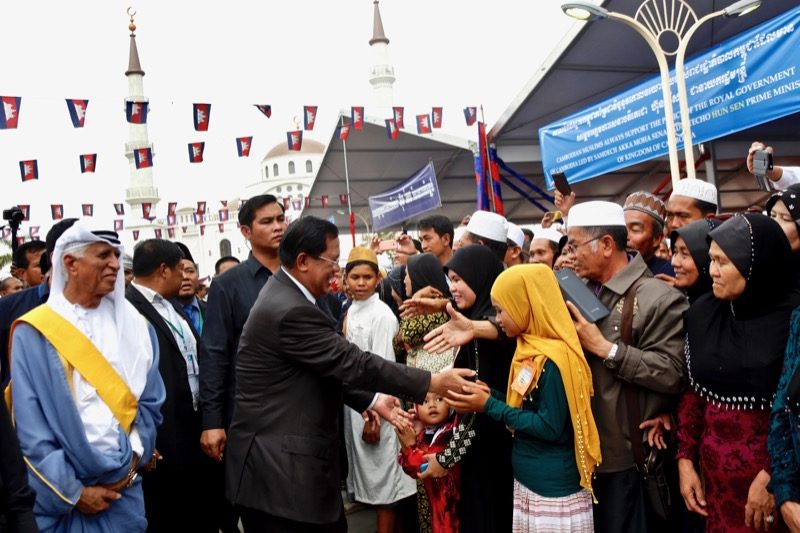Ask Cham motorbike taxi driver Ker Mertry how he’ll vote in upcoming elections, and he might initially sing the praises of the CPP.
“I support the current party because they have brought a lot of investors to develop the country,” Mr. Mertry said on Tuesday at a snack shop overlooking the Tonle Sap river in Chroy Changva commune. “We cannot trust the opposition party.”

Minutes later, however, the 30-year-old seemed less sure.
“My friends and relatives don’t really support the ruling party,” he said. “They have made many problems for the country.”
Mr. Mertry said his village, like many of the country’s Cham Muslim settlements, had long supported the CPP on the condition that the party made progress on issues like corruption and drug use.
“But we haven’t seen change, and now we aren’t sure we can support them in the next election,” he said.
Many in Mr. Mertry’s mostly Cham community share his ambivalence. In interviews on Tuesday, some said they’ll keep voting for the CPP, which has welcomed Muslims into its ranks and encouraged religious freedom after deadly persecution under the Khmer Rouge regime. But others, when pressed, said they’d soured on the party, even if they didn’t trust the opposition CNRP to govern any better.
Mat Azy, the snack shop’s 45-year-old owner, estimated that half of the community supports the opposition. Ms. Azy isn’t one of them, she told reporters as she swung her sleeping niece in a hammock.
The shop owner doesn’t track political news—“only government officials really know what’s going on,” she said—but plans to help the ruling party organize its campaign in the commune.
“The ruling party is helping us build a nice life,” she said, noting new roads and infrastructure.
Ms. Azy was skeptical the CNRP would do much better.
“Even if the current party loses the elections, I don’t think anyone would change the policies for my business or my community for the better,” she said.
It’s the kind of sentiment that has long propelled Cham turnout for the CPP, according to Alberto Perez-Pereiro, general manager of Breogan Consulting—which conducts social science and market research—who has extensively studied Cambodian Cham Muslim communities.
“Historically, Muslims have voted for the CPP,” he said on Tuesday, noting that the party had gone out of its way to be “as inclusive as possible to the Muslim minority.”
Prime Minister Hun Sen, who has been accused of being actively involved in a 1975 massacre of Chams as a Khmer Rouge deputy commander, has stoked fears that a change in government could prove devastating to the hundreds of thousands of Cham in the country.
In a 2015 Islamic New Year Facebook post, the prime minister warned that the opposition was stirring up the kind of revolutions that hit Iraq, Syria, or Egypt, where Muslims were “running from war almost every day.”
“We don’t need these types of changes in our country,” he wrote to the estimated 400,000 Cham Muslims in the country. “I hope Cambodian Muslims will pay more attention to this propaganda within your own community.”
But 38-year-old fisherman Ley Les, whose home is a boat docked on the shore in the shadow of Sokha Phnom Penh Hotel, was more concerned with finding a permanent home after three decades of bouncing from one temporary riverfront dock site to another, spurred by government evictions.
“That is the government’s duty: to find another home for us along the river,” he said.
Mr. Les said he would happily take the 20,000 riel, or about $5, the CPP offered locals to campaign on its behalf, but wasn’t sure the party had locked down his vote for the June 4 commune elections.
“I supported the ruling party because local authorities sometimes give us a little money for funerals or food and protect our safety—but I might change” affiliation, he said.
But neither did he put much stock in the CNRP.
“Even if we switch to supporting the opposition party in the elections, how much can we trust that they will follow their promises in the future?” he asked.
His neighbor Uk Sok was a fellow political fence-sitter, initially praising the responsiveness of local CPP leadership before changing his tune after a clutch of onlookers left.
If Mr. Hun Sen “holds power for many mandates, that is not the point” of elections, said Mr. Sok, the unemployed husband of a meat vendor. “I’m not really sure if they’ll win.”
Mr. Sok praised the opposition’s backing of garment workers, but didn’t like what he saw as their tendency to protest. He claimed he hadn’t made up his mind about which party to support.
“But maybe—probably—we need a change,” he said.




